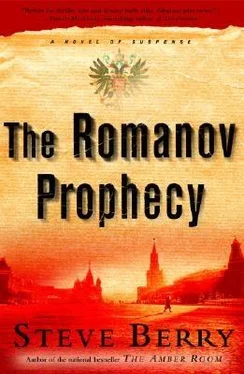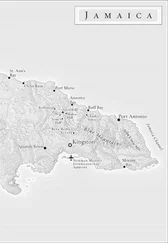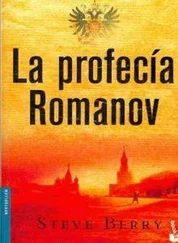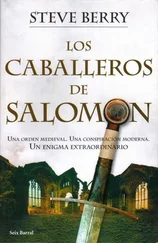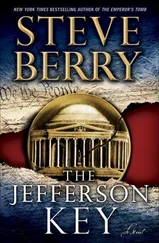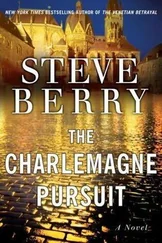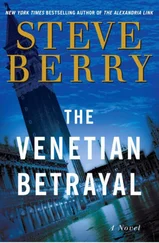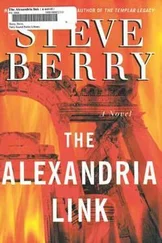Steve Berry - The Romanov Prophecy
Здесь есть возможность читать онлайн «Steve Berry - The Romanov Prophecy» весь текст электронной книги совершенно бесплатно (целиком полную версию без сокращений). В некоторых случаях можно слушать аудио, скачать через торрент в формате fb2 и присутствует краткое содержание. Жанр: Триллер, на английском языке. Описание произведения, (предисловие) а так же отзывы посетителей доступны на портале библиотеки ЛибКат.
- Название:The Romanov Prophecy
- Автор:
- Жанр:
- Год:неизвестен
- ISBN:нет данных
- Рейтинг книги:4 / 5. Голосов: 1
-
Избранное:Добавить в избранное
- Отзывы:
-
Ваша оценка:
- 80
- 1
- 2
- 3
- 4
- 5
The Romanov Prophecy: краткое содержание, описание и аннотация
Предлагаем к чтению аннотацию, описание, краткое содержание или предисловие (зависит от того, что написал сам автор книги «The Romanov Prophecy»). Если вы не нашли необходимую информацию о книге — напишите в комментариях, мы постараемся отыскать её.
The Romanov Prophecy — читать онлайн бесплатно полную книгу (весь текст) целиком
Ниже представлен текст книги, разбитый по страницам. Система сохранения места последней прочитанной страницы, позволяет с удобством читать онлайн бесплатно книгу «The Romanov Prophecy», без необходимости каждый раз заново искать на чём Вы остановились. Поставьте закладку, и сможете в любой момент перейти на страницу, на которой закончили чтение.
Интервал:
Закладка:
"May I make a suggestion, Mr. Lord?"
"Certainly."
"Have you been to the archives in St. Petersburg?"
He shook his head.
"A look there might be productive. They house many of Lenin's writings. Most of the tsar and tsarina's diaries and letters are stored there, too." He pointed to the sheets. "It might help discover the meaning of what you have found."
The suggestion seemed a good one. "Thank you, I just might do that." He glanced at his watch. "If you'll excuse me, I have more to read before this place closes. But I enjoyed talking. I'll be around for a few more days. Maybe we can chat again."
"I, too, will be in and out. If you don't mind, I think I might just sit here a little while. May I read those two sheets again?"
"Of course."
Ten minutes later when he returned, the writings by Alexandra and Lenin lay on the table, but Semyon Pashenko was gone.
SEVEN
5:25 PM
A dark bmw picked Hayes up in front of the Volkhov. After a fifteen-minute trek through surprisingly light traffic, the driver wheeled into a gated courtyard. The house beyond was late classical, built in the early part of the nineteenth century, then and now one of Moscow's showpieces. During the communist tenure it had been the Center for State Literature and Arts, but after the fall, like most things, the building went on the auction block and was eventually snapped up by one of the country's new rich.
Hayes stepped from the car and told the driver to wait.
As usual, two men armed with Kalashnikovs patrolled the courtyard. The house's blue stucco facade appeared gray in the dimming afternoon light. He sucked in a breath, bitter with carbon fumes, and stepped resolutely down a brick walk through a lovely autumn garden. He entered the house through an unlocked pine door.
The interior was characteristic for a dwelling built nearly two hundred years ago. The floor plan was an irregular hodgepodge, the formal reception areas knotted toward the front facing the street, various private living quarters in the rear. The decor was period and he assumed original, though he'd never asked the owner. He wound his way through a maze of tight corridors and found the paneled salon where the meeting always occurred.
Four men waited, each sipping drinks and smoking cigars.
He'd met them a year ago, and all of their subsequent communication had been through code names. Hayes was known as Lincoln, the other four by their chosen labels-Stalin, Lenin, Khrushchev, and Brezhnev. The idea had come from a popular print Moscow gift shops peddled. It depicted various Russian tsars, empresses, and Soviet premiers gathered around a table, drinking and smoking, with Mother Russia the single topic of discussion. Of course, no such meeting had ever occurred, but the artist graphically fantasized how each individual personality might have reacted given such an event. The four men had chosen their designated label carefully, reveling in the prospect that their meetings were not unlike the painting-and that the fate of the Motherland now rested in their hands.
The four extended a welcome and Lenin poured Hayes a vodka from a carafe chilling in a sterling ice bucket. A plate of smoked salmon and marinated mushrooms was offered. He declined. "I'm afraid I have bad news," he said in Russian, then told them about Miles Lord surviving.
"There is another matter," Brezhnev said. "We did not know until today this lawyer was an African."
Hayes thought the observation curious. "He's not. He's American. But if you mean his color, what does it matter?"
Stalin leaned forward. Unlike his namesake, he seemed always to be the voice of reason. "Americans have such a hard time understanding the Russian sensitivity to fate."
"And where exactly does fate tie in here?"
"Tell us about Mr. Lord," Brezhnev asked.
The entire subject bothered Hayes. He'd thought it strange they'd so nonchalantly ordered Lord's murder without knowing anything at all about him. At their last meeting Lenin had given him Inspector Orleg's telephone number and told him to arrange the murder through him. The instruction had bothered him at first-such a valuable assistant would be difficult to replace-but too much was at stake to be concerned about one lawyer. So he'd done as they asked. Now more questions. Ones that made little sense.
"Came to my firm right out of law school. Phi Beta Kappa at the University of Virginia. Always been interested in Russia, took a master's degree in Eastern European studies. Good with languages. Damn hard to find a lawyer who can speak Russian. I thought he'd be an asset, and I was right. Many of our clients rely on him exclusively."
"Personal information?" Khrushchev asked.
"Born and raised in South Carolina, somewhat affluent. His father was a preacher. One of those tent revivalists who traveled from town to town healing people. From what Lord tells me, he and his father didn't get along. Miles is thirty-eight or thirty-nine, never been married. Lives a fairly basic life, from all I see. Works hard. One of our top producers. Has never given me any trouble."
Lenin leaned back in the chair. "Why the interest in Russia?"
"Beats the shit out of me. From conversations he seems genuinely fascinated. Always has been. He's a history buff, his office is full of books and treatises. He's even done some lecturing at a couple of our local universities and at a few state bar meetings. Now let me ask something. Why is all this important?"
Stalin sat back. "That is immaterial, given what happened today. The problem of Mr. Lord will have to wait. What should concern us now is what happens tomorrow."
Hayes wasn't ready to change subjects. "For the record, I wasn't in favor of killing Lord. I told you I could handle him, whatever your apprehensions may have been."
"As you will," Brezhnev said. "We have decided that Mr. Lord is to be your concern."
"I'm glad we agree. He won't be a problem. But no one has yet to explain how he was a problem."
Khrushchev said, "Your assistant has been intent in the archives."
"That's what I sent him there to do. On your instructions, I might add."
The assigned task was simple. Find anything that could affect Stefan Baklanov's claim to the throne. And Lord had searched nearly ten hours a day for the past six weeks and reported everything he'd found. Hayes suspected something he'd passed on to the group had piqued these men's interest.
"It is not necessary," Stalin said, "that you know everything. Nor do I believe you really want to. Suffice it to say that we deemed the elimination of Mr. Lord the most economical way to handle the matter. That effort failed, so we are willing to take your advice. For now."
A grin accompanied the statement. Hayes didn't particularly like the condescending way these four treated him. He wasn't some errand boy. He was the fifth member of what he'd privately dubbed the Secret Chancellory. But he decided to keep his irritation to himself and changed the subject. "I assume the decision has been made that the new monarch will be absolute?"
"The question of the tsar's power is still a matter of debate," Lenin said.
He understood that some aspects of what they were doing were uniquely Russian, to be decided solely by Russians. And as long as those decisions did nothing to jeopardize the enormous financial contribution his clients were making and the sizable return he stood to enjoy, he didn't care. "What is the status of our influence with the commission?"
"We have nine who will vote as we say, no matter what," Lenin said. "The other eight are being approached."
"The rules will require unanimity," Brezhnev said.
Lenin sighed. "I wonder how we ever let that pass."
Unanimity had been an integral part of the resolution that created the Tsarist Commission. The people had approved both the idea of a tsar and a commission, with the check and balance that all seventeen commissioners must vote yes. One vote was enough to derail any attempt at stacking the deck.
Читать дальшеИнтервал:
Закладка:
Похожие книги на «The Romanov Prophecy»
Представляем Вашему вниманию похожие книги на «The Romanov Prophecy» списком для выбора. Мы отобрали схожую по названию и смыслу литературу в надежде предоставить читателям больше вариантов отыскать новые, интересные, ещё непрочитанные произведения.
Обсуждение, отзывы о книге «The Romanov Prophecy» и просто собственные мнения читателей. Оставьте ваши комментарии, напишите, что Вы думаете о произведении, его смысле или главных героях. Укажите что конкретно понравилось, а что нет, и почему Вы так считаете.
